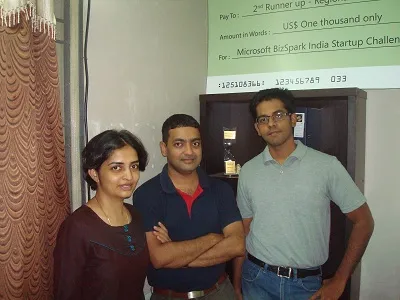ContractIQ’s 365 Startups aims to benefit one startup a day by finding the right developer, for free
Wednesday July 10, 2013 , 7 min Read

Ashwin Ramasamy received a rather unusual request. His answer on Quora on how India is rich in math talent was spotted by a UK company looking for creating math content on the mobile. The company was prompt in asking Ashwin to find the match to develop their mobile app. Ashwin, pushed into the minefield of deciphering the best mobile app developers for math, scrambled to list a bunch of them to the prospective customer. The deal went through after the customer selected one of the potential matches suggested by Ashwin. This is how ContractIQ, the company founded by Ashwin Ramasamy and Visalam Ramakrishnan, works. It takes requirements of buyers of services (80% of them for mobile apps) and from its database of “devshops” (small, independent businesses providing mobile app services, product development, software development, or others) suggests potential matches for the buyer. The devshops (vendors) are charged a fee for bidding for the prospective client and only three of them can bid for a particular project. The vendor base consists of trustworthy developers validated by ContractIQ so that the buyer can confidently seek. It ultimately becomes a win-win for buyers and developers..
Sixteen months into the startup, Ashwin is thinking of several avenues of engagement – and one such initiative is to do with startups. Named 365 Startups, this initiative of Contract IQ is aimed at helping one startup a day to find the right match of devshops for their needs. Such quality matches are hard to find for startups, which are starved of cash to pump into quality developer searches. Startups can realize savings of up to $500 through this initiative. Why focus on startups? Of the estimated 350,000 startups in the world, it is only relevant that they are served through a platform like ContractIQ, which has reach across the globe. “Startups are honest in their feedback,” points out Ashwin. This is another reason for ContractIQ going after them. They are proactive in providing the right pointers so that it helps their own interests.
The process of selecting the beneficiary startups is intense. “Most of the startups are not clear in their requirements,” says Ashwin. So out of the 130 applications received for this initiative, which started on July 1, only 10 requirements have qualified for ContractIQ’s 365 Startups program. The deal size should also be of a decent size to enthuse the developer as well. “We look for at least a $1000 deal in 365 Startups,” adds Ashwin. The vendor match for the startup requirement is restricted to three most probable developers. The three vendors then pay a sum to ContractIQ to bid for the requirements and one of them could go on to win the bid. “Vendors are willing to pay as it reduces their customer acquisition cost,” says Ashwin. The trusted network of vendors on ContractIQ was built diligently by sifting their profiles, through conversations, and through peer feedback.
Tapping into social media
Contract IQ’s social media strategy is robust. Influencers of developer community are tracked through their blogs and many a time ContractIQ reaches out to the prospective developer. An active ContractIQ blog keeps emitting content that speaks about problem-solving to relevant audience. Social media platforms such as LinkedIn, Facebook, and Twitter are used as conversation points to engage the community. Vijay, who works at ContractIQ, actively tracks the startup conversations and freely pitches in with possible solutions. When the actual need arises for someone, they are asked to register with ContractIQ. Many a time, the registration process is done by ContractIQ itself.
Many “idea” entrepreneurs seek out tech cofounders. ContractIQ comes in as a readymade solution to such entrepreneurs and encourages such startup entrepreneurs to abandon the futile search for cofounders and focus on developing the product with the developers. “The conversion rate is more than 50% here,” says Vijay. Many such entrepreneurs are identified through the Internet and social media.
The painpoints that are solved
When you wish to develop an app, for example, what are your challenges? You have to find the right developer with the right skill set quoting a fair price. This process itself can turn out to be tricky. For the buyer, Ashwin says, “ContractIQ helps to discover, evaluate, and engage the developer” (devshops in ContractIQ lingo) through their wide span of 70,000 developers. But even that many number to choose from can be daunting. Depending upon your requirements, the most suitable three are listed for you, out of which you can pick up one developer. At the next level of engagement, ContractIQ helps the buyer define the engagement process by telling the buyer how the developer works, what he can look for, and how to engage the developer meaningfully.
The developers (vendors for ContractIQ) are rich in tech talent and have skill sets necessary to build apps, products, or other custom solutions. But their biggest problem is finding customers. They cannot invest heavily in customer acquisition or a sales team. “For the tech-driven developers, qualified leads are provided by ContractIQ,” adds Ashwin, emphasizing that ContractIQ literally acts as their sales force. “Vendors were willing to pay 10% of their revenues,” Ashwin recalls, as scaling up by finding a customer base is a huge problem for devshops. In the earlier pricing model, devshops paid 10% of the deal to ContractIQ. Now the model is tweaked a bit that the devshops pay up ContractIQ for bidding a project. There are subscription plans also available for devshops. Beyond customer acquisition, ContractIQ also facilitates intricate, in-depth engagement with the buyers for the developers.
In future, Ashwin is planning to bring in benchmark pricing for each region in the world so that a buyer can validate the pricing he has been quoted with the regional benchmark, as the swings are wider. For example, a developer in Chennai who can charge up to $50 an hour, for example, ends up quoting $15 an hour. The benchmarking would set the price even, so that the developer and the buyer can both benefit.
Deal sizes
A highly educated customer approached ContractIQ for mobile app development with stringent requirements on the developer skillset, his or her communication abilities, and a faster deadline. But the customer was also insistent on a set fee, which was one-tenth of the benchmark rates. Ashwin turned down the customer. “We facilitate deal sizes upwards of $5000,” stresses Ashwin. The median deal size is between $30,000 and $40,000. Even a $250,000 deal has been made.

Funding and team
Follow-ups on blogging content and reaching it out to the relevant audience and reaching out to the developer/buyer community need several hands. The four-member team at present has its hands full. “We are a bit understaffed,” says Ashwin, pointing out the endless to-do list on the white board.
Although Ashwin has been approached for funding, he remains cautious. He has been working to put the growth drivers in place before closing any investment round. ContractIQ is now focused on fast scaling its developer network and buyer community. Still manual interventions are needed to validate buyer requirements and to convince the buyer of the matches. Lot of effort goes into educating the buyer as well to redefine their requirements so that it is understood by the developer. The developer network is also being developed. The ideal for Ashwin is an automated match-making (a buyer listing requirements and ContractIQ sending three perfect matches, and the deal happening between buyer and developer), which he hopes to achieve in another 12 months.
Website: ContractIQ






